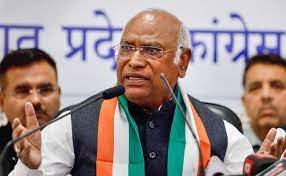The Reserve Bank of India’s (RBI) withdrawal of Rs 2,000 currency notes faces intense criticism from opposition leaders. Congress chief Mallikarjun Kharge took a dig at Prime Minister Narendra Modi, connecting his Japan visits with the RBI’s announcement. Kharge noted that whenever PM Modi goes to Japan, a “note bandi” notification follows, recalling the 2016 demonetization of Rs 500 and Rs 1,000 notes.
Kharge quipped, “Last time he went to Japan, he made a Rs 1,000 note bandi. This time, it’s a Rs 2,000 note bandi.” PM Modi arrived in Hiroshima for the G7 summit as part of his three-nation tour including Papua New Guinea and Australia.
Kharge labeled the withdrawal the “second demonetization” and demanded an unbiased investigation. He tweeted, “Is this a veil over a wrong decision? Only an unbiased investigation will reveal the truth.” Addressing a gathering after the swearing-in of Karnataka Chief Minister Siddaramaiah, Kharge expressed concerns about the move’s impact, stating that Modi’s repeated instances of “note bandi” troubled the people.

Kharge reassured the crowd that the newly formed Congress government in Karnataka, dubbed “a government of love,” would fulfill all five promises made before the polls. The RBI’s surprise announcement allows the public until September 30 to deposit or exchange the Rs 2,000 notes at banks. Unlike the sudden 2016 demonetization, the Rs 2,000 notes will remain legal tender until the specified deadline.
The withdrawal of high-denomination currency notes sparks debate and raises questions about its impact on the economy. Opposition criticism and public concerns intensify scrutiny on the RBI’s decision. The government now faces mounting pressure to address concerns and clarify the move’s objectives.
As the issue unfolds, Siddaramaiah is sworn in as Karnataka’s Chief Minister, accompanied by the induction of several ministers into the state cabinet. These events continue to shape the political landscape, with implications for the nation’s governance and future policies.


